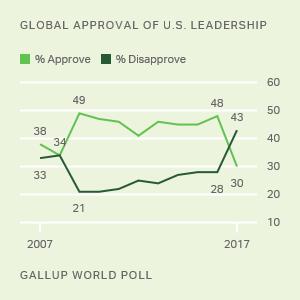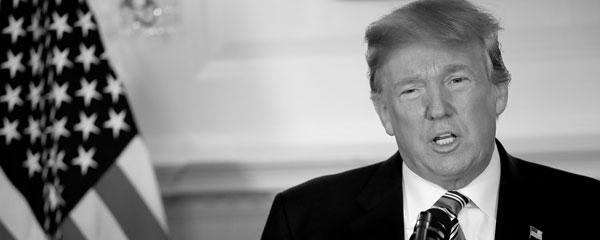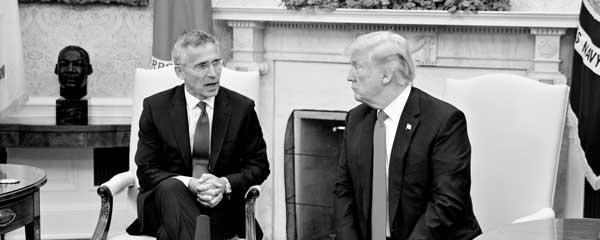Story Highlights
- Median approval of U.S. leadership holds steady at 31%
- China's leadership gains ground; approval up to 34%
- U.S., Russia get similar approval ratings for the first time
WASHINGTON, D.C. -- At the halfway mark of Donald Trump's presidency, shows the image of U.S. leadership is in poor shape, but its approval ratings are no longer in free fall.
After tumbling to a record-low 30% during the first year of Trump's presidency, the image of the U.S. is still as poor in his second. The median global approval rating that adults across 133 countries and areas give the job performance of U.S. leadership remained stable at 31% in 2018.

Following a year of epic losses in approval in 2017, when U.S. leadership ratings declined 10 percentage points or more in 65 countries, the dust settled in 2018. Out of 133 countries, U.S. leadership approval ratings declined substantially in just five countries -- Macedonia, Slovakia, Cambodia, Iran and Turkey.
U.S. leadership approval increased 10 points or more in a mix of 11 countries or areas spanning Africa, Asia and the Americas. There were no substantial increases in Europe.

China Overtakes U.S. Leadership, Russia Ties U.S.
Although the median approval rating for U.S. leadership did not change, the global balance of soft power continued to shift abroad. Germany securely remained the top-rated global power for the second consecutive year. However, the country's 39% approval rating in 2018 was its first score below 40% in a decade.

China and Russia, on the other hand, gained considerable ground. After tying with the U.S. in 2017, China edged farther ahead of the U.S. in 2018 with its leadership earning a median approval rating of 34%. This is China's highest score since 2009, but it is still well short of its previous highs.
Russia's approval rating rose to 30% in 2018, tying its previous high in 2008 and notably placing the ratings of the U.S. and Russia on nearly equal footing for the first time.
The approval ratings of China's and Russia's leadership rose substantially -- by at least 10 percentage points or more -- in more than a dozen countries, while they lost this much ground in relatively only a few. Neither Germany nor the U.S. saw substantial increases in as many countries.
In several instances, China and Russia gained ground last year where the U.S. lost it. For example, while ratings of Russia, China and the U.S. were each at about 30% in Turkey in 2017, China and Russia saw their ratings rise by at least 10 points in 2018, while the U.S. saw its rating drop 13 points.
Implications
The stagnant, low approval rating of 31% for the U.S. in 2018 suggests that the doubts sowed in Trump's first year about U.S. commitments abroad have taken root -- and the unpredictability of the U.S. president is now somewhat expected.
But even if some view this unpopularity as a byproduct of putting America first, it has provided an opening for China and Russia to assert their global influence. In this climate, China's leadership has gained a larger advantage in the "great power competition," and the other player, Russia, is now on a more even level with the U.S.
As the global balance of soft power continues to shift, it may prove even more difficult for the U.S. to counter this influence and remain relevant in the second half of Trump's presidency, unless the administration can erase some of the doubts that U.S. partners and allies have about its commitment.
Read the full results in ║┌┴¤═°'s report.
For complete methodology and specific survey dates, please review details.
Learn more about how the works.




